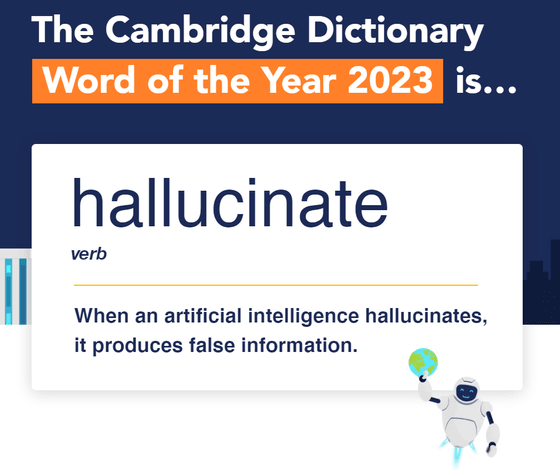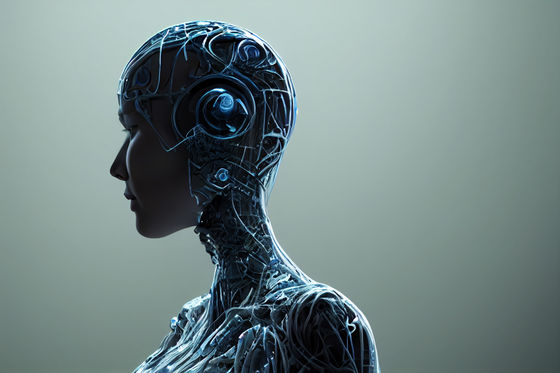'Hallucination' selected as Word of the Year in 2023 due to new meaning related to generative AI

The Cambridge Dictionary, published by the University of Cambridge, has announced that ``hallucinate'' has been selected as the word symbolizing 2023. Cambridge Dictionary states that the reason for its selection is that the word 'hallucination' has
The Cambridge Dictionary Word of the Year 2023
https://dictionary.cambridge.org/editorial/woty
Cambridge Dictionary names 'Hallucinate' Word of the Year 2023 | University of Cambridge
https://www.cam.ac.uk/research/news/cambridge-dictionary-names-hallucinate-word-of-the-year-2023
“Hallucinating” AI models help coin Cambridge Dictionary's word of the year | Ars Technica
https://arstechnica.com/information-technology/2023/11/thanks-to-ai-hallucinate-is-cambridge-dictionarys-word-of-the-year-for-2023/
Cambridge Dictionary's word of the year is ' hallucination ', with an added meaning: 'When artificial intelligence hallucinates, false information is generated.'

With the spread of AI tools based on large-scale language models such as ChatGPT, Bard, DALL-E, and BingAI, words such as 'large-scale language model,' 'generative AI,' and 'GPT' have been added to the Cambridge Dictionary. At the same time, new AI-related meanings have been added to existing items. One of them is 'hallucination.'
Regarding the reason for selecting 'hallucination', the Cambridge Dictionary editorial team said, 'We chose 'hallucination' as the word of the year for 2023 because we believe that this new meaning gets to the heart of why people talk about AI. AI is a powerful tool, but we are still learning how to safely and effectively interact with generative AI.'
The traditional meaning of hallucination is 'the appearance of seeing, hearing, feeling, or smelling things that are not there.' Later, it began to be used as a technical term in the field of machine learning, and as generative AI became more widespread, it came to be commonly used by the general public as well. However, some argue that using the same term as human physiological phenomena to describe the issue of AI generating incorrect information is an unnecessary anthropomorphism, and the debate continues.

Henry Sheflin, who studies the ethical issues of AI at the University of Cambridge, said, ``The reason why 'hallucination' is so widely used to refer to mistakes made by systems like ChatGPT is because of how we think about AI. It provides an interesting perspective on anthropomorphism, although inaccurate or misleading information has been with us for a long time in the form of rumors, propaganda, or fake news. I think the psychological vocabulary we use will continue to expand to encompass the strange capabilities of the new intelligences we are creating.'
Additionally, AI illusions are already having an impact on the real world. For example, as a result of an American law firm using ChatGPT for research, a fictitious case created by AI was cited in court.
Lawyer who adopted non-existent past precedent fabricated by ChatGPT is ordered to pay $5,000 - GIGAZINE

Wendalyn Nichols, publishing manager at Cambridge Dictionaries, said: 'The fact that AI can 'hallucinate' is a reminder that humans need to demonstrate critical thinking skills when using these tools. Let me remind you once again: AI is great at processing vast amounts of data, extracting specific information, and integrating it, but the more creative we ask them to be, the more They are more likely to go astray.”
In addition to 'hallucination,' Cambridge Dictionary also lists other words that have attracted attention in 2023, including ' implosion ,' which was frequently used in the Titan disaster , and 'ennui,' a French robber who explained in court the reason for his escape from prison. ``Ennui, '' which attracted attention when he said, ``I'm sorry,'' and ` `grifter,' ' which became a hot topic after being uttered in quick succession to public figures such as Prince Harry, Duke of Sussex. The list includes ` `GOAT: Greatest of All Time' ' whose identity has been the subject of debate.
Related Posts:
in Note, Posted by log1l_ks







